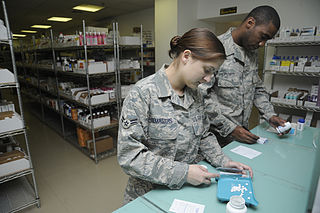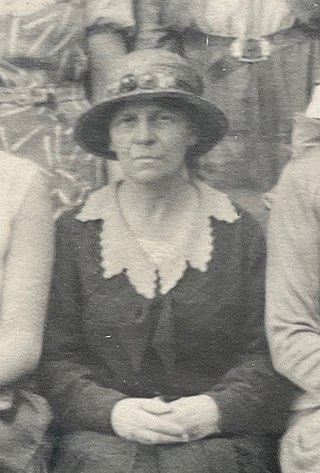Related Research Articles

A pharmacist is a healthcare professional who specializes in the preparation, dispensing, and management of medications and who provides pharmaceutical advice and guidance. Pharmacists often serve as primary care providers in the community, and may offer other services such as health screenings and immunizations.
The Royal Pharmaceutical Society of Great Britain (RPSGB) existed from its founding as the Pharmaceutical Society of Great Britain in 1841 until 2010. The word "Royal" was added to its name in 1988. It was the statutory regulatory and professional body for pharmacists and pharmacy technicians in England, Scotland and Wales. In September 2010, the regulatory powers of the Society were transferred to the newly formed General Pharmaceutical Council (GPhC). The RPSGB became the Royal Pharmaceutical Society (RPS) at that time and retained its professional leadership role; the "Great Britain" part of the name was dropped for day-to-day purposes.

A pharmacy technician performs pharmacy-related functions. Training, certification, licensing, and actual practice of pharmacy technicians varies not only worldwide but in some countries regionally as well as by employer.
The Royal Pharmaceutical Society is the body responsible for the leadership and support of the pharmacy profession (pharmacists) within England, Scotland, and Wales. It was created along with the General Pharmaceutical Council (GPhC) in September 2010 when the previous Royal Pharmaceutical Society of Great Britain was split so that representative and regulatory functions of the pharmacy profession could be separated. Membership in the society is not a prerequisite for engaging in practice as a pharmacist within the United Kingdom. Its predecessor the Pharmaceutical Society of Great Britain was founded on 15 April 1841.
Master's degrees in pharmacy comprise both postgraduate and integrated master's programs in pharmacy, the latter of which comprises both undergraduate and postgraduate coursework and typically takes four to five years to complete.
The basic requirement for pharmacists to be considered for registration is often an undergraduate or postgraduate pharmacy degree from a recognized university. In many countries, this involves a four- or five-year course to attain a bachelor of pharmacy or master of pharmacy degree.
The General Pharmaceutical Council (GPhC) is the body responsible for the independent regulation of the pharmacy profession within England, Scotland and Wales, responsible for the regulation of pharmacists, pharmacy technicians and pharmacy premises. It was created, along with the Royal Pharmaceutical Society, in September 2010 when the previous body responsible for regulation, the Royal Pharmaceutical Society of Great Britain, was split so that representative and regulatory functions of the pharmacy profession could be separated.
Pharmacy2U is an online pharmacy located in the UK. Pharmacy2U has been involved in piloting the electronic transfer of prescriptions in the UK. They manage NHS repeat prescriptions on behalf of patients. Pharmacy2U was founded by pharmacist Daniel Lee in November 1999. It launched to the public in June 2000.
Jean Kennedy Irvine was a pharmacist from Hawick, Scotland and the first woman president of the Royal Pharmaceutical Society of Great Britain.
Pharmacy in the United Kingdom has been an integral part of the National Health Service since it was established in 1948. Unlike the rest of the NHS, pharmacies are largely privately provided apart from those in hospitals, and even these are now often privately run.
The Company Chemists’ Association was established in 1898. It aims to influence policy and support market development for its members, all large businesses.
The National Association of Women Pharmacists was founded in London on 15 June 1905, following discussions between Margaret Elizabeth Buchanan and Isabella Skinner Clarke. Early meetings were held at Clarke's home. Membership was restricted to those who had passed the major or minor examination and 50 women joined immediately. By 1912 Buchanan claimed that practically all women practicing pharmacy were members. Buchanan served as its president at one point.
Margaret Elizabeth Buchanan was a British pharmacist and pioneer of women in pharmacy.
Frances ("Fanny") Elizabeth Deacon (1837–1930) was an English chemist and druggist who was the first woman to qualify after the 1868 Pharmacy Act, which made registration with the Pharmaceutical Society of Great Britain (PSGB) compulsory in order to work as a pharmacist.
Isabella Skinner Clarke–Keer was a British pharmacist and pioneer of women in pharmacy. In 1875, she became the first woman to qualify as a Pharmaceutical Chemist, and was one of the first two women members of the Pharmaceutical Society of Great Britain, admitted in 1879. In 1905, she became the first President of the National Association of Women Pharmacists.
Rose Coombes Minshull (1845–1905) was one of the first two women members of the Pharmaceutical Society of Great Britain (PSGB), admitted in 1879.

Hope Constance Monica Winch was an English pharmacist and academic.

Elsie Higgon was the first Joint Secretary of the (National) Association of Women Pharmacists; researcher for King's College, the British Medical Journal and the British Pharmaceutical Codex; Lecturer in Chemistry at Portsmouth Municipal College; proprietor pharmacist of two businesses in Hampstead, proprietor of the Gordon Hall School of Pharmacy for Women in Gordon Square, and a supporter of the suffrage movement.

Katherine M King PhC was a pharmacist and joint proprietor of the Gordon Hall School of Pharmacy for Women in Gordon Square.
Ella Corfield was a British pharmacist, achieving pioneering academic work in her early career and later business management. She also held senior ranks in the British Red Cross.
References
- ↑ "RPS rebrands British Pharmaceutical Students' Association". Pharmacy Business. 6 September 2021. Retrieved 10 November 2022.
- ↑ "BPSA president steps down owing to 'conflicting priorities'". Pharmaceutical Journal. 4 January 2019. Retrieved 10 February 2019.
- ↑ "British Pharmaceutical Students' Association". Medway School of Pharmacy. Retrieved 10 February 2019.
- ↑ "Students give GPhC feedback on 'unfair' June pre-reg exam". Chemist and Druggist. 23 July 2018. Retrieved 10 February 2019.
- ↑ "Black African pharmacy students still least likely to pass GPhC prereg exam". Pharmaceutical Journal. 13 September 2018. Retrieved 10 February 2019.
- ↑ "GP pharmacist push blamed for Lloydspharmacy's recruitment challenges". Chemist and Druggist. 22 January 2019. Retrieved 10 February 2019.